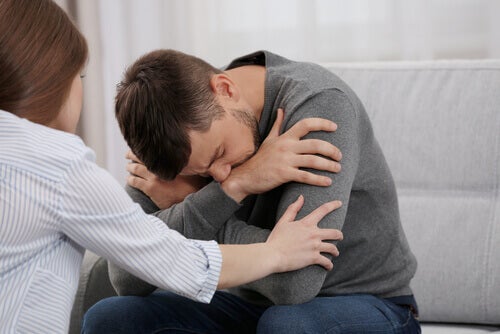The Challenges of an Anxious-Avoidant Relationship

An anxious-avoidant relationship is a type of bond in which restlessness, possessiveness, and insecurity predominate. In principle, it’s due to unresolved issues in those who establish this type of connection. However, there are times when anxious behavior is also unleashed or fueled by the other partner.
Some say that paranoid people can also be persecuted and this is more or less what happens in anxious-avoidant relationships. There’s a basic feeling of insecurity but the person who feels it isn’t the same one who either nurtures or triggers it. In other words, one of the partners can feed anxious attachment.
It isn’t easy to distinguish a person with anxious attachment from one whose partner is indeed evasive and triggers anxiety. For the same reason, many people in situations like this can’t answer a simple question. Is my insecurity making me anxious or is it my partner’s behavior?
“In dating, avoidants can be charming and have learned all the social graces—they often know how they are expected to act in courtship and can play the role well for a time.”
-Jeb Kinnison-

The anxious-avoidant relationship
Anxious attachment, also called “ambivalent attachment”, is a form of bond in which there’s a great desire for intimacy with one’s lover. However, at the same time, there’s a deep fear of losing that person. This feeling leads to an apprehensive interpretation of any manifestation, though minimal, of distancing or rejection.
In fact, an anxious person interprets many types of behaviors that neither involve distancing nor mean rejection this way. Thus, they greatly mistrust their significant other and everything related to it prevails in the end. Also, there’s a disproportionate reaction to countless behaviors that don’t deserve it.
In these cases, the partner’s response is rather important. Ideally, you should adopt an understanding attitude and know that this anxiety stems from deep insecurities and unresolved trauma at times. A person with anxious attachment needs more warmth and reassurance from their partner. Thus, the anxiety will decrease if they feel confident about it.
The elusive partner
Someone with anxious attachment doesn’t need a person to take charge of their insecurity and fears. However, they don’t need someone who makes them feel insecure either. An avoidant partner does just that. In fact, they increase their significant other’s anxiety, thus reinforcing this harmful type of attachment. Although they may not even realize it most of the time, they could also use it as a power play.
An elusive partner is one who flees or remains silent in the face of conflict. Also, one who wants a quick fix for a problem, without really delving into what’s happening. Or perhaps it’s one who intellectualizes everything and doesn’t allow their emotions to surface. Likewise, it could be one who becomes irritated or uncomfortable when confronted with their partner’s emotional expression.
Another characteristic of this type of person is their emotional lack of availability. It’s quite harmful for an anxious person to have a partner who doesn’t want to fully be in a relationship and avoids commitment by insisting they want no “ties”. They may also ridicule or minimize emotions. This type of behavior only leads to insecurity in their significant other.

Is it me? Or is it them?
It’s often difficult to know when you’re caught in an anxious-avoidant relationship because one of you can’t overcome certain inappropriate behaviors. Perhaps you have no attachment problems but become anxious and insecure when your partner says and does things that lead to unresolved conflicts.
To know if you’re caught in an anxious-avoidant relationship because you’re uncomfortable in it, you must identify if such fears are completely valid. For instance, you may be afraid that:
- Your lover isn’t as committed as you are.
- You can’t resolve conflicts because your significant other refuses to confront them.
- You’re not being heard or understood by your partner.
- You feel extremely vulnerable.
You might have an elusive partner if any of these fears are present in your relationship. Other fears such as the fear of losing your lover or the fear they’ll stop loving you and fall in love with someone else speak of a predominance of anxious attachment in your relationship, rather than an elusive partner, in general terms.
An anxious-avoidant relationship is a type of bond in which restlessness, possessiveness, and insecurity predominate. In principle, it’s due to unresolved issues in those who establish this type of connection. However, there are times when anxious behavior is also unleashed or fueled by the other partner.
Some say that paranoid people can also be persecuted and this is more or less what happens in anxious-avoidant relationships. There’s a basic feeling of insecurity but the person who feels it isn’t the same one who either nurtures or triggers it. In other words, one of the partners can feed anxious attachment.
It isn’t easy to distinguish a person with anxious attachment from one whose partner is indeed evasive and triggers anxiety. For the same reason, many people in situations like this can’t answer a simple question. Is my insecurity making me anxious or is it my partner’s behavior?
“In dating, avoidants can be charming and have learned all the social graces—they often know how they are expected to act in courtship and can play the role well for a time.”
-Jeb Kinnison-

The anxious-avoidant relationship
Anxious attachment, also called “ambivalent attachment”, is a form of bond in which there’s a great desire for intimacy with one’s lover. However, at the same time, there’s a deep fear of losing that person. This feeling leads to an apprehensive interpretation of any manifestation, though minimal, of distancing or rejection.
In fact, an anxious person interprets many types of behaviors that neither involve distancing nor mean rejection this way. Thus, they greatly mistrust their significant other and everything related to it prevails in the end. Also, there’s a disproportionate reaction to countless behaviors that don’t deserve it.
In these cases, the partner’s response is rather important. Ideally, you should adopt an understanding attitude and know that this anxiety stems from deep insecurities and unresolved trauma at times. A person with anxious attachment needs more warmth and reassurance from their partner. Thus, the anxiety will decrease if they feel confident about it.
The elusive partner
Someone with anxious attachment doesn’t need a person to take charge of their insecurity and fears. However, they don’t need someone who makes them feel insecure either. An avoidant partner does just that. In fact, they increase their significant other’s anxiety, thus reinforcing this harmful type of attachment. Although they may not even realize it most of the time, they could also use it as a power play.
An elusive partner is one who flees or remains silent in the face of conflict. Also, one who wants a quick fix for a problem, without really delving into what’s happening. Or perhaps it’s one who intellectualizes everything and doesn’t allow their emotions to surface. Likewise, it could be one who becomes irritated or uncomfortable when confronted with their partner’s emotional expression.
Another characteristic of this type of person is their emotional lack of availability. It’s quite harmful for an anxious person to have a partner who doesn’t want to fully be in a relationship and avoids commitment by insisting they want no “ties”. They may also ridicule or minimize emotions. This type of behavior only leads to insecurity in their significant other.

Is it me? Or is it them?
It’s often difficult to know when you’re caught in an anxious-avoidant relationship because one of you can’t overcome certain inappropriate behaviors. Perhaps you have no attachment problems but become anxious and insecure when your partner says and does things that lead to unresolved conflicts.
To know if you’re caught in an anxious-avoidant relationship because you’re uncomfortable in it, you must identify if such fears are completely valid. For instance, you may be afraid that:
- Your lover isn’t as committed as you are.
- You can’t resolve conflicts because your significant other refuses to confront them.
- You’re not being heard or understood by your partner.
- You feel extremely vulnerable.
You might have an elusive partner if any of these fears are present in your relationship. Other fears such as the fear of losing your lover or the fear they’ll stop loving you and fall in love with someone else speak of a predominance of anxious attachment in your relationship, rather than an elusive partner, in general terms.
All cited sources were thoroughly reviewed by our team to ensure their quality, reliability, currency, and validity. The bibliography of this article was considered reliable and of academic or scientific accuracy.
- Casullo, M. M., & Liporace, M. F. (2005). Evaluación de los estilos de apego en adultos. Anuario de investigaciones, 12, 183-192.
- Salazar Gutiérrez, S. G., & Sotelo Castro, A. F. (2021). Influencia del apego adulto sobre la dependencia emocional en las relaciones de pareja de estudiantes universitarios.
- Chicomin Torres, J. C. (2021). El apego inseguro en la infancia y su repercusión en las relaciones de pareja en adultos.
This text is provided for informational purposes only and does not replace consultation with a professional. If in doubt, consult your specialist.







